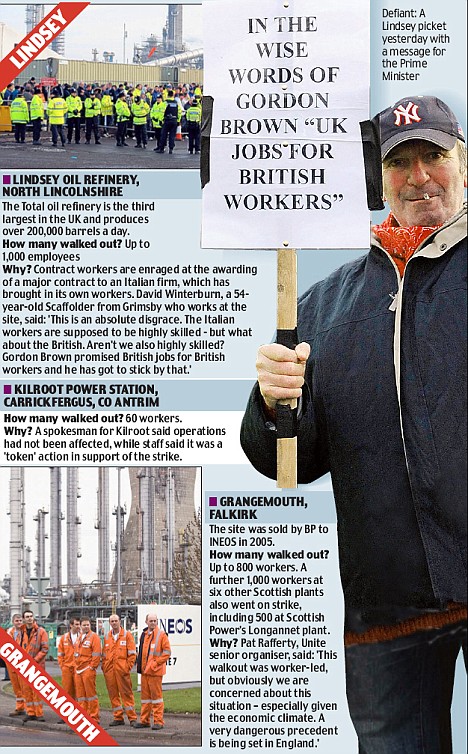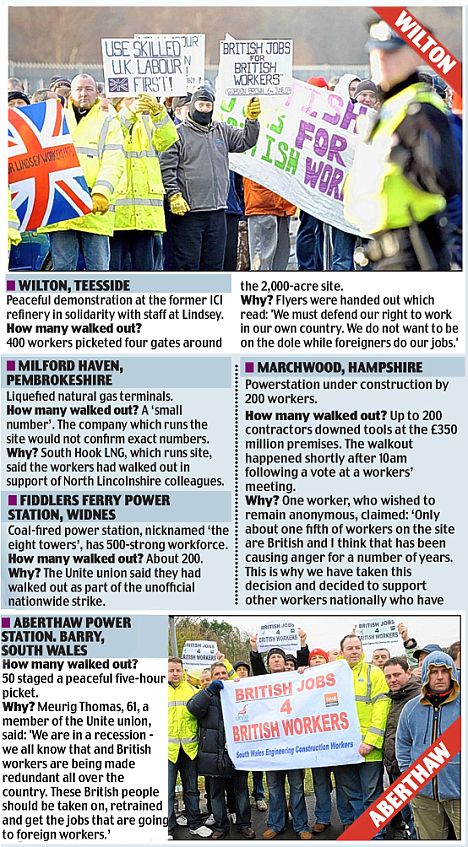THE RECESSION
As the recession bites, workers in the four main areas of the United Kingdom - Scotland, England, Wales and Northern Ireland - have downed tools in what is the biggest strike action the country has seen since the Miners' Strike of 1984, when thousands of coal miners lost their jobs after Prime Minister Margaret Thatcher started closing the mines.
Now, workers are angry at the use of foreign labour.
The protests by 4,000 English, Scottish, Welsh and Northern Irish workers raised fears that the country could be gripped by months of increasingly bitter strike action, reminiscent of the dark days of the 1970s and 1980s.
The protest started at Britain's third-largest oil refinery at Killingholme, near Grimsby, Lincolnshire, which produces 200,000 barrels of crude oil a day. It rapidly spread as workers shared their fury and their fears for the future.
In September 2007, Prime Minister Gordon Brown promised "British jobs for British workers."
But since then the number of migrants employed has risen sharply while the number of Britons has dropped.
The Government's own statistics show that, in the 12 months after Mr Brown's speech, the number of foreign workers rose by 175,000 as the number of British in work fell by 46,000.
'British jobs for British workers': Wildcat strikes spread over foreign workers shipped into the UK
By Becky Barrow and Paul Sims
31st January 2009
Daily Mail
The hollowness of Gordon Brown's pledge to create 'British jobs for British workers' was exposed tonight as wildcat strikes spread across Britain in protest at the use of foreign labour.
Since the Prime Minister made his promise in September 2007, the number of migrants employed has risen sharply while the number of Britons has dropped.
The Government's own statistics show that, in the 12 months after Mr Brown's speech, the number of foreign workers rose by 175,000 as the number of British in work fell by 46,000.

Protesters block the main gate to the Wilton Chemical Complex on Teesside in support of a mass walkout by energy workers in Lincolnshire
It is this continuing trend that many union leaders believe sparked today's wave of sympathy strikes which caught up to 17 refineries and power plants all over Britain by surprise.
With no sign of peace last night, the protests by 4,000 English, Scottish, Welsh and Northern Irish workers raised fears that the country could be gripped by months of increasingly bitter strike action.
The protest started at Britain's third-largest oil refinery at Killingholme, near Grimsby, which produces 200,000 barrels of crude oil a day. It rapidly spread as workers shared their fury and their fears for the future.
The strikes, which threaten to disrupt energy supplies, are being led by workers angry that the French oil company Total is using an Italian firm which employs Italian and Portuguese workers to carry out maintenance at the plant.
Click to Enlarge
From dawn, thousands of angry workers stood on picket lines in freezing conditions in a wave of illegal strikes not seen for decades.
Many placards directed their fury at Mr Brown's pledge at the Labour party conference in September 2007 when he said: 'This is our vision: Britain leading the global economy . . . drawing on the talents of all to create British jobs for British workers.'
One placard said: 'In the wise words of Gordon Brown: UK Jobs for British Workers.'
Bernard McAuley, the Unite union regional officer at Killingholme, said workers are 'very, very angry' and are 'determined' to carry on the strike.
He said: 'The simple fact is the Italian company which won the contract have refused to employ British workers who are local, unemployed, skilled and are ready and waiting.
'Everyone is concerned that this is the future and they are saying enough is enough.'
Total UK, part of the French-owned oil giant which owns the 40-year-old Lindsey site at Killingholme, insisted there will be 'no direct redundancies' as a result of the contract being awarded to the Italian firm.
The turmoil comes as about 2,500 people are being made redundant every day, nearly 600 small firms are collapsing every week and unemployment has jumped to 1.9million.
This is the largest number of people who are out of work and looking for a job since Labour came to power in 1997 - and it is predicted to keep on climbing.
Analysis of official labour force statistics shows that in the 12 months after Mr Brown's pledge the number of workers born outside the UK rose from 3,548,000 to 3,723,000 - a rise of 175,000.
At the same time, the numbers of British men and women in work fell from 25,771,000 to 25,725,00, a fall of 46,000.
A dramatic fall in private sector employment came in the three months that ended in October last year, the last quarter for which unemployment figures have so far been released.
During July, August and September private sector employment dropped by 128,000.
But over the same three months 14,000 extra public sector workers were hired.
One fear is that the strikes could be exploited by the far right British National party, which has been leafleting in Grimsby.
Tory leader David Cameron said Mr Brown was paying the price for using the language of the BNP, as he backed demands for an explanation from Total.
'The Prime Minister should never have used that slogan,' Mr Cameron said.
'On the one hand he lectures everyone about globalisation and on the other he borrows this slogan from the BNP.
'He has been taking people for fools and has been found out.'
Employment minister Pat McFadden insisted that he is sympathetic to the workers' concerns, but cannot endorse illegal strike action.
He said: 'I understand people's concern about employment issues.
'Jobs are a concern in every community in the country because of impacts of the global downturn. But we can't and don't support unofficial strike action.'
How the anger flared around Britain
Click to Enlarge
Click to Enlarge

Click to Enlarge
dailymail.co.uk
As the recession bites, workers in the four main areas of the United Kingdom - Scotland, England, Wales and Northern Ireland - have downed tools in what is the biggest strike action the country has seen since the Miners' Strike of 1984, when thousands of coal miners lost their jobs after Prime Minister Margaret Thatcher started closing the mines.
Now, workers are angry at the use of foreign labour.
The protests by 4,000 English, Scottish, Welsh and Northern Irish workers raised fears that the country could be gripped by months of increasingly bitter strike action, reminiscent of the dark days of the 1970s and 1980s.
The protest started at Britain's third-largest oil refinery at Killingholme, near Grimsby, Lincolnshire, which produces 200,000 barrels of crude oil a day. It rapidly spread as workers shared their fury and their fears for the future.
In September 2007, Prime Minister Gordon Brown promised "British jobs for British workers."
But since then the number of migrants employed has risen sharply while the number of Britons has dropped.
The Government's own statistics show that, in the 12 months after Mr Brown's speech, the number of foreign workers rose by 175,000 as the number of British in work fell by 46,000.
'British jobs for British workers': Wildcat strikes spread over foreign workers shipped into the UK
By Becky Barrow and Paul Sims
31st January 2009
Daily Mail
The hollowness of Gordon Brown's pledge to create 'British jobs for British workers' was exposed tonight as wildcat strikes spread across Britain in protest at the use of foreign labour.
Since the Prime Minister made his promise in September 2007, the number of migrants employed has risen sharply while the number of Britons has dropped.
The Government's own statistics show that, in the 12 months after Mr Brown's speech, the number of foreign workers rose by 175,000 as the number of British in work fell by 46,000.

Protesters block the main gate to the Wilton Chemical Complex on Teesside in support of a mass walkout by energy workers in Lincolnshire
It is this continuing trend that many union leaders believe sparked today's wave of sympathy strikes which caught up to 17 refineries and power plants all over Britain by surprise.
With no sign of peace last night, the protests by 4,000 English, Scottish, Welsh and Northern Irish workers raised fears that the country could be gripped by months of increasingly bitter strike action.
The protest started at Britain's third-largest oil refinery at Killingholme, near Grimsby, which produces 200,000 barrels of crude oil a day. It rapidly spread as workers shared their fury and their fears for the future.
The strikes, which threaten to disrupt energy supplies, are being led by workers angry that the French oil company Total is using an Italian firm which employs Italian and Portuguese workers to carry out maintenance at the plant.
Click to Enlarge

From dawn, thousands of angry workers stood on picket lines in freezing conditions in a wave of illegal strikes not seen for decades.
Many placards directed their fury at Mr Brown's pledge at the Labour party conference in September 2007 when he said: 'This is our vision: Britain leading the global economy . . . drawing on the talents of all to create British jobs for British workers.'
One placard said: 'In the wise words of Gordon Brown: UK Jobs for British Workers.'
Bernard McAuley, the Unite union regional officer at Killingholme, said workers are 'very, very angry' and are 'determined' to carry on the strike.
He said: 'The simple fact is the Italian company which won the contract have refused to employ British workers who are local, unemployed, skilled and are ready and waiting.
'Everyone is concerned that this is the future and they are saying enough is enough.'
Total UK, part of the French-owned oil giant which owns the 40-year-old Lindsey site at Killingholme, insisted there will be 'no direct redundancies' as a result of the contract being awarded to the Italian firm.
The turmoil comes as about 2,500 people are being made redundant every day, nearly 600 small firms are collapsing every week and unemployment has jumped to 1.9million.
This is the largest number of people who are out of work and looking for a job since Labour came to power in 1997 - and it is predicted to keep on climbing.
Analysis of official labour force statistics shows that in the 12 months after Mr Brown's pledge the number of workers born outside the UK rose from 3,548,000 to 3,723,000 - a rise of 175,000.
At the same time, the numbers of British men and women in work fell from 25,771,000 to 25,725,00, a fall of 46,000.
A dramatic fall in private sector employment came in the three months that ended in October last year, the last quarter for which unemployment figures have so far been released.
During July, August and September private sector employment dropped by 128,000.
But over the same three months 14,000 extra public sector workers were hired.
One fear is that the strikes could be exploited by the far right British National party, which has been leafleting in Grimsby.
Tory leader David Cameron said Mr Brown was paying the price for using the language of the BNP, as he backed demands for an explanation from Total.
'The Prime Minister should never have used that slogan,' Mr Cameron said.
'On the one hand he lectures everyone about globalisation and on the other he borrows this slogan from the BNP.
'He has been taking people for fools and has been found out.'
Employment minister Pat McFadden insisted that he is sympathetic to the workers' concerns, but cannot endorse illegal strike action.
He said: 'I understand people's concern about employment issues.
'Jobs are a concern in every community in the country because of impacts of the global downturn. But we can't and don't support unofficial strike action.'
How the anger flared around Britain
Click to Enlarge

Click to Enlarge


Click to Enlarge

dailymail.co.uk
Last edited: